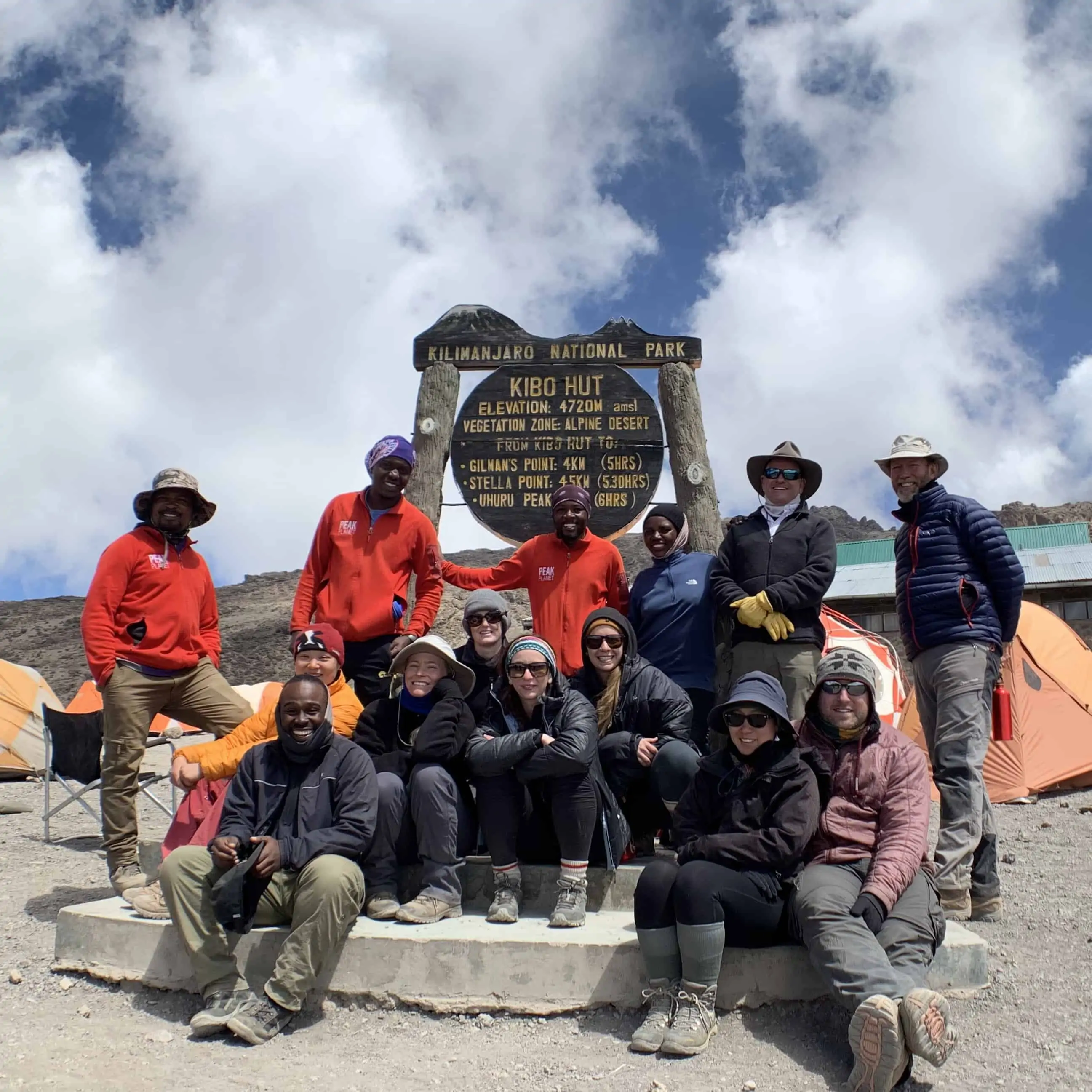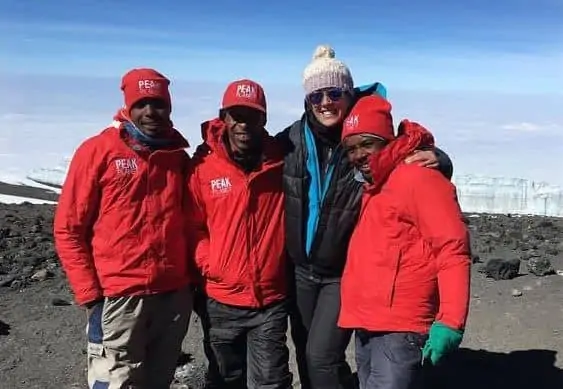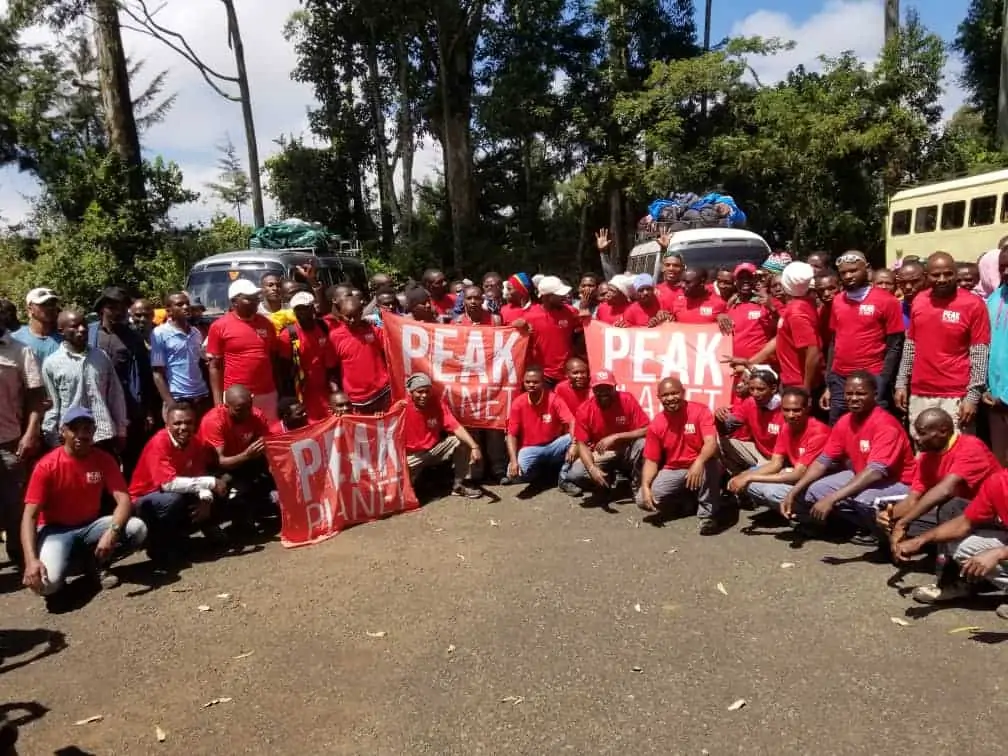The Best Guides on Kilimanjaro
Our local guides are experts on Kilimanjaro
Peak Planet guides are highly experienced, medically trained and committed to your safety.
The importance of your Kilimanjaro crew cannot be underestimated. A quality guide and porters will make for a wonderful time on the mountain, while a mediocre staff can put your life in danger.
Lesser companies employ guides who lack advanced medical training, industry certifications and proper safety equipment. Additional, they hire a guide solely, while the rest of the crew remains unknown as they are contracted by the guide himself. Climbers may end up with inexperienced, part-time, or even dishonest people accompanying them on their climb.
We spend a great deal of attention to finding the right staff.
Each and every employee, from the lead guide to porter, has been screened intensely prior to hire, and only the top performers are retained. Because of this rigorous process, we can ensure professional, high quality, consistent performance across the board. This is very rare among Kilimanjaro operators. We are one of only a handful of companies that operate this way. Though certainly more expensive and laborious for us, knowing that our clients are on the mountain with the best crew makes the process well worth the time and effort.
If you peruse any Kilimanjaro operator’s website, almost certainly they will claim to have the best guides. Obviously that cannot be true for everyone. The truth is that you would be hard-pressed to find an excellent guide at a mediocre company. Only the better outfitters have the ability to acquire, train and retain talented and knowledgeable guides. In other words, the best guides work for the best companies.
The vast majority of companies on Kilimanjaro operate at a low level. This should be a concern to everyone who climbs, including all guides and porters. There will always be risks in high altitude trekking, but with proper diligence, many accidents can be prevented. We at Peak Planet, and the other excellent companies on the mountain, sincerely hope to raise the bar so that all visitors receive adequate care and service.


When you climb with us, you climb with the best crew on Kilimanjaro, period.
We only hire the best, most accomplished, experienced Kilimanjaro guides. Our local guides are experts on the mountain. Each of our guides is licensed by Kilimanjaro National Park, speaks English fluently, and leads climbs on Kilimanjaro on a regular basis. By guiding around 20 expeditions per year, their knowledge and skills are consistently tested and strengthened. Most have summited Kilimanjaro between 100-300 times! They know how to lead clients to the top, safely and professionally.
Importantly, our climbs are staffed with a ratio of one guide per two clients. We believe this level of attention increases the success rate and safety as each climber receives a high degree of personal interaction, evaluation, and encouragement.
We believe that safety is the most important aspect of the climb experience.
It is our job to keep you safe on Mount Kilimanjaro. When climb with us, you are literally trusting us with your life. We take this responsibility very seriously. So we provide our guides with the most up to date medical training on high altitude medicine and mountain rescue.
You might think that all guides on Kilimanjaro receive the same training. That is partly true. To be licensed by the park authorities, guides must complete coursework in various aspects of guiding, including medical instruction. This is basic education and the minimum knowledge required to be a certified guide. Many do not receive any additional training and pick up tidbits as they gain experience on the mountain. This is not ideal, yet is the standard for most Kilimanjaro companies and their guides.
Our guides start with first aid training from Kilimanjaro National Park, but it doesn’t stop there. Each is certified as a Wilderness First Responder and then receives advanced training from IFREMMONT, a European high altitude medical training organization. Every year, multiday training courses are held off-site to reevaluate and refresh their knowledge.
This extensive training program assures that our guides are well prepared for any situation they encounter.
Peak Planet is committed to your safety. 100% of our staff is fully vaccinated against Covid-19, including all mountain crew members, safari guides, drivers, and administrative employees).
What Makes Peak Planet Guides Better?
Many visitors climb Kilimanjaro and unbeknownst to them, they are accompanied by novice, uneducated or untrained guides. Unfortunately, their abilities, or lack thereof, are not apparent until there is an emergency.
Some guides do not carry any safety equipment, or they do not know how to use it. We have heard of instances where guides had oxygen tanks that were empty, missing parts, or otherwise malfunctioning. We have seen some guides that were completely unfamiliar with how to operate oxygen bottles or know when to employ them. And others who did not have a clue of what a pulse oximeter did or what oxygen saturation numbers meant. We have seen some guides dragging their barely conscious clients up the mountain when clearly they should have been going down. These actions are horrifying. The low standard of care on Kilimanjaro is a danger to the entire industry.
At Peak Planet, each member of our team is certified as a Wilderness First Responder (WFR). They receive advanced training in preventing, identifying, and treating altitude-related issues from our in-house program which was developed by IFREMMONT – an organization that specializes in high altitude medical training. And they enroll in refresher courses on first aid and mountain rescue every year.
The safety practices we implement are very robust. Most companies do not do half of what we do. But we believe that our program protects our clients as much as possible from the risks of high altitude trekking. The atmosphere of continuing education coupled with consistent practice in the field makes Peak Planet guides the best on the mountain.
- Licensed by Kilimanjaro National Park Service
- Highly experienced in leading climbs on Kilimanjaro (20+ times per year and 100-300 summits)
- Certified Wilderness First Responders (WFR)
- Trained by IFREMMONT – a European high altitude medical training organization
- Re-trained on a yearly basis on first aid and mountain rescue procedures
- Conduct health checks twice daily using pulse oximeters and stethoscopes to evaluate heart rate, oxygen saturation and lung function
- Carry emergency oxygen, a fully stocked medical kit and other safety gear depending on the route
- Administer optional ALTOX Personal Oxygen Systems
- Initiate rescue anywhere on the mountain with Garmin satellite GPS
- Coordinate AMREF Flying Doctors helicopter evacuation for severely injured or ill climbers
- Handle emergencies including rescue and evacuation using established protocols
Porters are the real stars on Kilimanjaro
For every climb, we assemble a competent team of lead guides, assistant guides, cooks, porters, and other camp staff. Frequent collaboration between staff yields a team dynamic that translates into an unparalleled level of service. Our job is to support you on the mountain in every way possible so that you don’t have to perform any chores while you are with us. You can simply enjoy the hike and take in the experience.
Porters are the lifeblood of Kilimanjaro. Without them, there would be very few people climbing the mountain. They play a big part in the success of all visitors. After all, they perform the hard labor which allows guests to walk easier, stay well fed and well hydrated, and sleep comfortably. Despite this, many operators on Kilimanjaro do not have adequate standards for their porters. In fact, some do not even know who their porters are. Porters have the hardest jobs on the mountain yet are the ones most commonly exploited.
Porter abuse is big problem on the mountain. There are operators that simply do not care about the welfare of their porters, or worse, some intentionally engage in unfair and unethical practices when dealing with porters. Other companies may make claims of ethical treatment of porters, but do not uphold their words. There are some popular operators that overload their porters, pay their porters a very low wage, feed their porters only once per day, do not look after sick or injured porters, do not provide proper shelter or clothing, and do not offer any skills or language training.
We are a steward of ethical staff treatment.
We are a member of the Kilimanjaro Porters Assistance Project (KPAP) – a nonprofit organization that seeks to improve the working conditions on Mount Kilimanjaro. To become a KPAP member, strict guidelines on wages, workloads and overall conditions must be adhered to. We are very proud to have this designation.
The only way to be sure your operator treats its staff fairly is to climb with a KPAP Partner Company like us.

When you climb with Peak Planet, you can be confident that your guides and porters are treated well.
One of the fundamental founding principles of our company is that we have always wanted to treat our staff fairly. We evenly distribute the work between the staff to keep everyone busy during the climbing season. We understand that to have and retain the best guides, porters and mountain crew, we have to compensate them accordingly.
Our porters have adequate clothing for the harsh mountain climate. And if any members of our mountain crew become sick, they have access to the same medical and rescue care as our clients. We also pay for their treatment and pay them in full for their work.
Every climb departs with an ample food supply so that crews are well fed for the duration of the trip. Our porters and guides are fed three full meals per day. After every trip, we examine our tents and repair any leaks or flaws that would compromise the porters’ shelter.
Please select your operator with porter welfare in mind.

